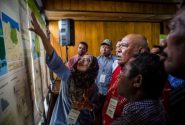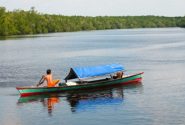
Communities may not effectively implement emission reduction activities in an area because they fear they may lose their rights when parties with stronger legal documents claim it. CIFOR/Yayan Indriatmoko
BOGOR, Indonesia (31 May, 2013) – Local communities must have secure tenure rights if they are to manage forests to reduce greenhouse gas emissions from deforestation — but they also need an interest in doing so, a study in Indonesia has found.
“Tenure security is a necessary condition for REDD+, but it’s not sufficient by itself,” said Daju Resosudarmo, scientist at the Center for International Forestry Research (CIFOR) and lead author of the paper Does tenure security lead to REDD+ effectiveness? Reflections from Five Emerging Sites in Indonesia recently published in World Development.
“First, people need to know if they will have the right to claim the benefits from REDD+. But even then, if REDD+ can’t compete economically with activities that emit greenhouse gases, then people are not likely to be interested in it,” she added.
The study, which was conducted as part of CIFOR’s Global Comparative Study on REDD+, analyzed data collected in 2010 from 20 villages in five REDD+ project sites in Aceh, West Kalimantan and Central Kalimantan, focusing on local people’s tenure rights, their perceptions of their rights and the link between tenure security and the effectiveness of REDD+.
Reducing Emissions from Deforestation and forest Degradation, or REDD+, is a global mechanism aimed at mitigating climate change by providing incentives to reduce greenhouse gas emissions from deforestation and forest degradation.
But for incentives to be allocated, clear and secure land tenure arrangements have to be in place, previous CIFOR research has shown.
“And we have to remember that tenure security not only protects the rights of people to reduce emission but also to increase them,” said Resosudarmo.
“So secure tenure will only lead to REDD+ effectiveness if stakeholders have an interest in reducing degradation and deforestation and engage in the implementation.”
What’s yours is mine too
Land conflicts are common in Indonesia, where forest resources are not only a source of wealth, livelihoods and power, but are also contested between various levels of government, communities and business interests. Indonesia is an important country for REDD+ because of its enormous forest area, high deforestation rates and large volume of emissions from deforestation.
Under Indonesian law, forest lands are under the purview of the state, but many areas are actually used, managed or claimed by individuals and communities. This inconsistency between de jure and de facto control of the land could hinder REDD+ projects in Indonesia in achieving their aims, according to the report.
“The ambiguity between de jure and de facto has created difficulties for some projects in securing claims or managing their sites,” said Stibniati Atmadja, a co-author of the paper.
“Our early findings also appear to indicate that this lack of tenure clarity can lead to lack of clarity over the division of costs and benefits between de jure and de facto land managers and users.”
And this lack of clarity will likely undermine efforts to reduce emissions, the study found. Communities may not effectively implement emission reduction activities in an area because they fear they may lose their rights when parties with stronger legal documents claim the area.
Show me the money
But if local people do not have an interest in preserving forests, then having secure tenure could actually increase their ability to cause emissions, the study highlighted.
“The assumption that communities around forests are consistently interested in forest protection needs to be reexamined,” said Andini Desita Ekaputri, another co-author of the paper.
“We found that households have little interest in preserving standing forest unless it is important for their livelihoods.”
More than half of the households sampled receive no income at all from forests, while a quarter received up to 25 percent of their income from forests. Rather, households depend more on agriculture for their livelihoods.
That generating income is more important for villagers than protecting forest for its own sake is reflected in their decision to engage in potentially “competing” activities. For example, villagers were found to support the expansion of oil palm plantations on forested areas or take jobs in oil palm plantations.
“Communities have to have an economic interest in protecting and enhancing forest-based carbon resources,” Resosudarmo said.
“If they don’t, then stronger tenure security, while necessary, does not guarantee REDD+ effectiveness. If communities have strong tenure security but will get greater economic benefits from cutting down trees than from preserving them, then REDD+ effectiveness is at risk.”
For more information on the issues discussed in this article, please contact Daju Resosudarmo at d.resosudarmo@cgiar.org
This work is part of CIFOR’s Global Comparative Study on REDD+ and was carried out as part of the CGIAR Research Program on Forests, Trees and Agroforestry. It is supported by AusAid, the UK Department for International Development (DFID) and the Norwegian Agency for Development Cooperation (NORAD).
We want you to share Forests News content, which is licensed under Creative Commons Attribution-NonCommercial-ShareAlike 4.0 International (CC BY-NC-SA 4.0). This means you are free to redistribute our material for non-commercial purposes. All we ask is that you give Forests News appropriate credit and link to the original Forests News content, indicate if changes were made, and distribute your contributions under the same Creative Commons license. You must notify Forests News if you repost, reprint or reuse our materials by contacting forestsnews@cifor-icraf.org.










